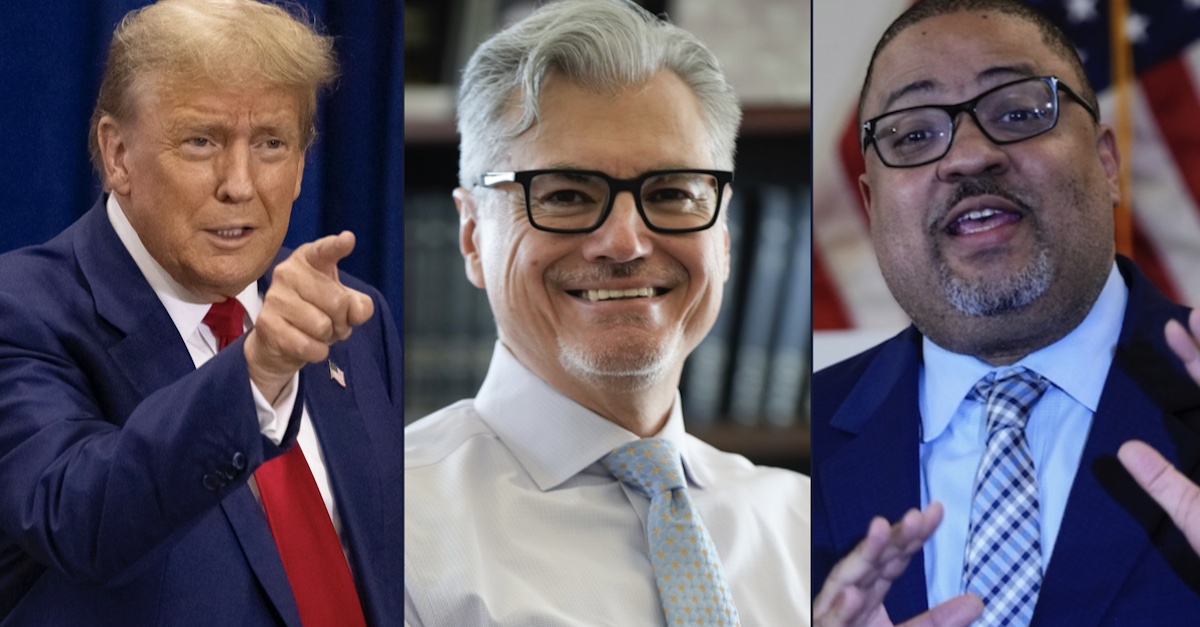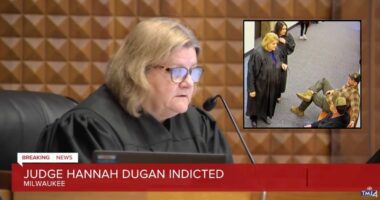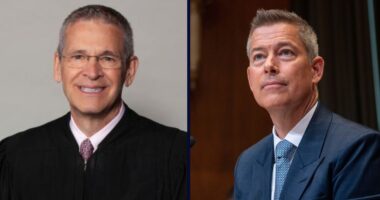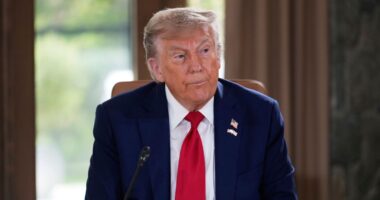
Left to right: Former President Donald Trump delivers a speech at a rally in Green Bay, Wisconsin on Tuesday, April 2, 2024 (AP Photo/Mike Roemer). Judge Juan Merchan is photographed in his chambers in New York on Thursday, March 14, 2024 (AP Photo/Seth Wenig). In the third image, Manhattan District Attorney Alvin Bragg is seen gesturing during a news conference on February 22, 2024, in New York (AP Photo/Frank Franklin II).
Attorneys for President-elect Donald Trump on Friday again asked the judge overseeing his New York City-based hush-money case to dismiss the indictment and vacate the jury’s guilty verdicts.
Earlier this week, Manhattan District Attorney Alvin Bragg filed the state’s response to Trump’s motion to dismiss.
In the 82-page filing, the Democratic Party prosecutor suggested New York Supreme Court Justice Juan Merchan could use the “abatement-by-death” process to give the case some finality.
In the 23-page reply, a section header refers to the district attorney’s suggestion as a “Dark Dream Scenario” that is “Not An Option.”
Trump’s attorneys Todd Blanche and Emil Bove rubbished the idea as an effort to “fabricate” an “unconstitutional” adventure into a “Wonderland” and “make new law contrary to binding precedent.”
In the state’s brief, Bragg admits that New York does not use the form of abatement that his office is proposing – and directs the court’s attention to the “Alabama rule.” The district attorney describes the rule as: “when a defendant dies after he is found guilty, but before the conviction becomes final through the appellate process, the court places in the record of the case a notation to the effect that the conviction removed the presumption of innocence but was neither affirmed nor reversed on appeal because the defendant died.”
The state’s brief then explains how Merchan might apply the Alabama rule to the present case involving the 45th and 47th president:
In this way, the Alabama rule abates the criminal proceedings without vacating the underlying conviction or dismissing the indictment. As applied here, this Court could similarly terminate the criminal proceeding by placing a notation in the record that the jury verdict removed the presumption of innocence; that defendant was never sentenced; and that his conviction was neither affirmed nor reversed on appeal because of presidential immunity.
It makes sense to borrow from the manner in which courts address abatement because many of defendant’s arguments here parallel the arguments made in favor of dismissal and vacatur upon a defendant’s death.
Those notions, Trump’s reply argues, amount to something not entirely unlike appalling – and, in any event, are precluded by law.
“As a further illustration of DA Bragg’s desperation to avoid legally mandated dismissal, [Bragg’s office] proposes that the Court pretend as if one of the assassination attempts against President Trump had been successful,” the latest motion reads. “[Bragg’s office] also thinks it ‘makes sense’ for Your Honor to pretend that the Court is in Alabama. These abatement arguments are absurd.”
While headline-generating, the abatement-by-death suggestion is one of many arrows in the district attorney’s quiver.
Late last month, Bragg’s office made it clear prosecutors intend to push forward and ask for Trump to be sentenced in connection with his 34 felony convictions on charges of falsifying business documents — after he finishes his second term as president in January 2029.
That is still Bragg’s preferred method here – effectively keeping the case in a state of formal legal limbo for the next four years. But, this week, Bragg theorized that Trump could still be formally sentenced immediately – while keeping any resulting consequences at bay.
“If defendant is sentenced before his inauguration, such a stay would merely place appellate proceedings in abeyance,” the DA’s motion reads. “If defendant takes future steps to stay his sentencing and succeeds in doing so, such a stay would delay his sentencing until after the end of his presidential term.”
Trump wholly rejected that idea, too.
To hear the once-and-future president tell it, a recent memo by the Office of Legal Counsel relied upon by special counsel Jack Smith foreclosed against keeping a sitting president under the threat of criminal sanction – period. While the case law cited Smith – and subsequently relied upon by the defense – is necessarily federal in nature, Trump says the parallels are obvious and apply here.
The defense reply explains, at length:
President Trump would be “legally stigmatized,” in violation of the Constitution, by the proposed stay because he would be denied “any meaningful opportunity to respond to his accusers in a court of law.” The “mere pendency of an indictment” violates Presidential immunity. OLC’s conclusions are grounded in reality and compelling. [Bragg’s office] offers no persuasive reason to avoid them. Staying the proceedings during President Trump’s second term would impede the Presidency and give New York County intolerable leverage over the Executive Branch, which exists for the protection of the entire Nation…
In addition, a stay would require President Trump to lead the Country while facing the ongoing threat that this Court and [Bragg’s office] are prepared to impose imprisonment, fines, and other punishment as soon as he leaves Office. To be clear, President Trump will never deviate from the public interest in response to these thuggish tactics. However, the threat itself is unconstitutional, under the Presidential Transition Act, the Presidential immunity doctrine, and the Supremacy Clause, because it would exacerbate the stigma and distraction burdens discussed above…
Trump’s team reiterates its arguments from their earlier brief. Namely, that dismissal is required by the presidential immunity doctrine, the Presidential Transition Act, and the Supremacy Clause of the U.S. Constitution.
The heart of the defense brief, however, is steeped in attacks on Bragg’s character – and heavy focus is on the abatement idea.
Again, the defense filing:
[Bragg’s] brief includes a request that the Court disregard the New York Court of Appeals and fabricate unconstitutional “abatement” law, all based on an extremely troubling and irresponsible analogy between President Trump—who has survived multiple assassination attempts, and will soon be “the only person who alone composes a branch of government”—and a hypothetical dead defendant. That unhinged contention demonstrates conclusively that DA Bragg and [the DA’s office] cannot be trusted to separate their political motivations and careerist ambitions from their obligations to seek justice.










